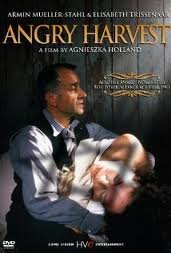
ANGRY HARVEST (BITTERE EMTE)
Germany, 1985, 102, Colour.
Armin Muhler- Stuhl, Elisabeth Trissenaar.
Directed by Agnieszka Holland.
Angry Harvest is a powerful German/Polish film co-written and directed by Agnieska Holland (writer-director of To Kill a Priest, concerning the murdered priest, Father Popalausko, during the Solidarity period in the mid-'80s). She moved to the United States and made The Secret Garden, Washington Square and The Third Miracle.
This film is about World War Two, ordinary citizens of a Polish village, strongly Catholic, strongly anti-semitic. The anti-semitism stems from the wealth of the Jews, their aristocratic style in pre-war Poland and the servant and serf-life position of the Catholics. The film focuses on a former seminarian, a single man, afraid of women yet preoccupied with sex. He is a kindly man and takes pity on a Jewish refugee whom he finds and hides in his cellar. She also becomes the object of his passion. The film shows the community of the village, especially the priest and his sister, an interfering neighbour, a wealthy Jew who is taken by the soldiers.
The film is a fine portrait study, a memory of prejudices underlying the action of the war, a critique of Polish Catholicism and anti-semitism. The star is Amin Muehler- Stuhl, the celebrated East German actor (Lola, The Wounded Man) who went to the United States in the late '80s and starred very effectively in Costa Gavras's Music Box and Barry Levinson's Avalon. He was the father in Shine.
1. The impact of this film for Polish and German audiences? Jewish audiences? Audiences outside Europe? Memories of World War Two? Anti-semitism? The film's relevance in the '80s?
2. The Polish village, the German border, the fields, the town, homes, poverty, the Occupation? The ordinary lifestyle of the village? The musical score - and echoes of Middle European music?
3. The title, reference to the war, Poles and Germans, to Leon, to the Jewish refugees?
4. The portrait of Leon: middle age, alone, his religious values, the period in the seminary, his declarations about God's will? His shyness, awkwardness with women, the priest's sister? Sexual preoccupation, masturbation, confession? His work, wealth? The background of his being a servant and his resentment against the Jews? The possibility of buying Jewish property to help them with cash to escape, and building up his own property? His reluctance? The finding of Rosa, looking after her, hiding her in the cellar? Supporting her? Talking, understanding her? Tying her scarf in the forest? His sexual advances, her reluctance, her giving in, his satisfaction? The emotional response? Looking after her, letting her out? The village speculation? His going into the village, confession, God's will? His discussions with her about Judaism, conversion? His theology and spirituality and is narrowness? Her wanting to come out, his offering to keep her during the war, his wanting to move her to a safer house? The woman whom he admired, the possibility of marriage? Rosa and her reluctance, her suicide, his burying her in the cellar? His prospects, the money for Reuben's farm, Rosa's husband and Reuben's daughter coming, giving them the money? His neighbour, prying? The death of the collaborator? The dangers of the war, Rosa's death, his continuing on - and the letter that he received from the refugees from America and the good deed that he had done?
5. The prologue, Rosa in the train, her daughter, refugees, escapes from the train, deaths in the wood? Her being found, looked after, brought back to health? Her longing for her husband? The Jewish background, the discussions about Christianity and belief? God? Her reluctance with Leon's advances, succumbing to him, sympathy, any love? Her wanting to be out, the threat of going to another house, killing herself? The pathos of her husband coming?
6. The meddling neighbour, money deals, anti-semitic stances? Interactions with Leon? The collaborator, bringing Reuben to Leon to negotiate the money for the farm? The Underground, their approaching Leon, the appeal to patriotism, his being watched, the priest's sister and her infatuation with Leon, going in his stead, her death? The priest, the confessional relationship, outside confession, grief at his sister's death? The wealthy old lady, Leon's relationship with them in the past, the daughter's, her death, the possibility of marrying, finding a house for her?
7. The Jews, their status in Poland, their wealth, Christian servants, trying to sell their property, getting money to escape? Reuben and his visit to Leon? The death of the broker?
8. Life in the village? The war? Hostilities? Leon in the ordinariness of life, the interaction with Rosa, a changed life?